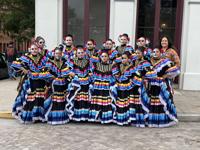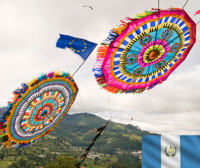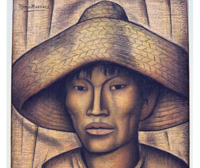
From left: Roger Quiles, board member for Latinx in Gaming; Brenda Castillo, president & CEO of the National Hispanic Media Coalition; Antonio Tijerino, president & CEO of the Hispanic Heritage Foundation; Congressman Joaquin Castro; and Estuardo Rodriguez at the Latino Representation in Gaming press conference. (Photo courtesy of NHMC)
Although 80% of Latinx adults in the US are likely to play video games versus 62% of Whites, Latinos only account for 8.1% of video game developers compared to 70% of their white counterparts, according to the National Hispanic Media Coalition (NHMC).
On September 12, Representative Joaquin Castro (D-TX), along with the NHMC and various national Latine organizations, announced the formation of the Latino Representation in Gaming Coalition (LRGC) at the National Press Club in Washington, DC.
“[The LRGC] is a coalition of Latino-led civil, human rights and gaming organizations that have come together to seek to bridge the gap between the Latino communities’ overrepresentation as gamers and consumers and their underrepresentation in the industry's workforce content creation and marketing practices,” said Randy Abreu, policy council at the NHMC.
The NHMC is a Latina-led non-profit civil and human rights organization that advocates for the rights of Latinx in and around media and entertainment. As the policy council, Abreu leads the policy department with three pillars: digital equity, Latine representation and platform accountability.
Increasing Latinx visibility in the gaming industry hits home for NHMC president and CEO Brenda Victoria Castillo, whose son grew up playing video games.
“With Latine individuals playing video games more than any other group, it has never been more important to have the games we play reflect the positive stories and portrayals our communities want to tell,” Castillo said at the launch of the LRGC.
“Some folks don't consider themselves gamers, but are when you include cell phones,” said Abreu.

Representative Joaquin Castro (D-TX) speaking at the LRGC press conference. (Photo courtesy of NHMC)
Alongside the NHMC, the Hispanic Heritage Foundation (HHF), Congressional Hispanic Caucus Institute (CHCI), MANA, Latinx in Gaming, Hispanic Association for Corporate Responsibility and Latino Corporate Directors Association and Estuardo Rodriguez have founded the LRGC to advocate for topics they have pushed for individually—more transparency, greater Latino representation in the industry, leadership and content including narratives and depiction of Latino characters, along with more development of and greater representation of Latino creators and developers and fomenting an inclusive and inviting environment for Latinos interested in the industry.
“With the support of Congressman Joaquin Castro, it takes our advocacy work to another level in building those bridges with the gaming industry themselves and working towards our purpose,” Abreu said. “I feel privileged to work on the coalition and help lead it, to research and find out how many Latinos consider themselves gamers, and yet, we don't have a seat at the table in a lot of aspects of the gaming industry.”
CALÓ News sat down with Abreu to discuss the LRGC’s goals, how to become involved and what the future might look like.
Answers have been edited for clarity and brevity.
How did these various national Latine organizations come together to form this coalition?
A lot of these organizations have been doing work around representation and, some, representation in gaming for some time now. Latinx in Gaming has specifically worked towards increasing Latino representation of developers, and they've been doing a lot of work behind the scenes just on that very targeted facet. The Hispanic Association for Corporate Responsibility and Latino Corporate Directors Association have been working generally on increasing Latino representation in C-suite positions and leadership boards.
What is the purpose/mission of the LRGC?
In gaming, some companies are headquartered in other countries, and they would have a US presence… Some of them are big corporations that include gaming, such as Microsoft or Sony. But [some are] focused specifically on developing, creating games, marking and selling games, like Epic Games or EA Sports. Some have a physical retail presence like Nintendo, which covers all of them in terms of retail presence, making games or selling consoles and hardware. When you look at it that way, the gaming industry itself, in 2023, the US video game industry generated and supported more than $101 billion in total economic impact.
When broken down, it means that the US video game industry contributed nearly $66 billion to the US GDP in 2023.
Over 73% of Latinos consider themselves gamers.

Brenda Victoria Castilla, President & CEO of NHMC, speaking at the LRGC press conference. (Photo courtesy of NHMC)
For this industry that has a huge impact on our daily lives to not have a relationship with the civil rights and advocacy community of the US seems like a missed opportunity where we can all work together.
That's the big, important goal, to build that relationship and build that community so that we can start having important conversations.
The first goal is championing transparency in the video game industry, from how games are made to who's behind them…How can we begin to grow and improve if we don't have information?
There was a 2024 report that said Latinos account for about 9% of game developers, while the white population accounts for 65% of game developers.
Increasing and advocating for more numbers in terms of Latino creators is a goal and purpose.
Also, how many games have been created to depict Latinas and tell a Latina story? How many games are out there that just tell a Hispanic story, period? Those numbers don't exist. What we often see is Latinos heavily represented in video games as gang members or violent depictions.
We're developing a relationship of transparency and trust.
Our last goal is to create an inclusive space where Latinos feel welcome in gaming. When we get to that better world, it's going to be good for everyone. It's going to be good for Latinos, for the gaming industry and for the country and the world as a whole.
In what ways does the LRGC plan to increase transparency and Latino representation as well as create a more inclusive environment within the gaming industry?
We launched on September 12 and are currently doing outreach and engaging with the video game companies themselves, such as the Electronic Software Association. Building that trust with the leadership at those companies and continuously talking about increasing numbers. Each organization in the coalition brings us specific expertise, so we see ourselves as a resource to the video game industry. If numbers are low in terms of representation in the video game industry, they are aware of it, acknowledge it, and want to improve. Now, we're in a great position for the LRGC to share its resources and its expertise. That's our value to this relationship. We know where the Latino developers are. We have connections with people who can represent C suites and boards. We have ideas and have already created pilots and programs on Workforce Training and also games that have better depictions of Latino representation. One group in our coalition, the Hispanic Heritage Foundation, worked recently with Minecraft Education, to create a game called Latin Explorers. It's a Minecraft-developed game centered around Hispanic heritage, learning about influential Latinos throughout history… It was created 100% by a group of Latines.
We also want to push for games such as The Latin Explorers because Latinos (17%) and Black (29%) teens were surveyed and pulled by Pew Research earlier this year and they are more likely to play video games to learn new things or compete and connect with friends than white (7%) teens.
How does the LRGC plan to bridge the gap between the Latine community's overrepresentation as gamers and consumers and underrepresentation in the industry's workforce, content and marketing?
There are Latinos or gamers who are interested in the gaming industry and are not aware at all that there are opportunities out there. If there are opportunities out there, to connect with the gaming industry and the opportunities they have, the LRGC is an outlet to share those opportunities. Additionally, if there is a sufficient amount of opportunities, that means that the gaming industry is aware and wants to increase Latino representation. They can create programs that can be marketed to people. There are opportunities to engage with Latino-serving institutions and colleges where workforce training programs and Opportunity Grants can be shared with students. The Gaming Coalition itself has an outreach side that looks towards the public and an outreach side that looks towards the video game industry. Through that connection and building out tangible projects that we know work and sharing opportunities with the public, we'll start to see a bridging of that gap. There's going to be a lot of opportunities that present themselves that we don't see yet as we engage with each other, and we'll be ready to take that on as well.

Antonio Tijerino, President & CEO of the Hispanic Heritage Foundation, speaking at the LRGC press conference. (Photo courtesy of NHMC)
How can interested individuals/parties become involved with the LRGC?
Currently, there's a website that shares more information about the LRGC, and we recommend folks to follow the National Hispanic Media Coalition and sign up for updates from NHMC to be updated on the LRGC. In terms of more outreach with the public, that's something that we're working on currently and thinking through what our efforts look like next year. We're currently in the stage of making sure that a relationship is built with the industry itself.
Why is the LRGC such an important resource and tool for the Latine community?
It's a space where Latines are fully represented as creators, storylines, the workforce leadership and Board of Directors of the gaming industry. Efforts by Latino groups and Latino coalitions to bridge these same divides when it comes to representation in government and the corporate workforce, have been done and were very successful…There's a huge opportunity here to change the trajectory of Latinos as a culture in the next few decades to come, and it's all happening and starting right now.
Although the coalition was only launched just over a month ago, what is on the horizon for the LRGC? What is hoped for in the future?
We will always advocate for Latino representation in these games and push for authentic stories. We'll support developers and creators to get the spotlight they deserve. Right now, we are focusing heavily on that transparency aspect and building connections with the video game industry so that we are all working together towards these same goals. Building those relationships to increase the data that we have and championing transparency at the very beginning is going to be important because it's a little disingenuous to suggest what to do [to increase representation in the workforce] without knowing the facts and numbers.
















(0) comments
Welcome to the discussion.
Log In
Keep it Clean. Please avoid obscene, vulgar, lewd, racist or sexually-oriented language.
PLEASE TURN OFF YOUR CAPS LOCK.
Don't Threaten. Threats of harming another person will not be tolerated.
Be Truthful. Don't knowingly lie about anyone or anything.
Be Nice. No racism, sexism or any sort of -ism that is degrading to another person.
Be Proactive. Use the 'Report' link on each comment to let us know of abusive posts.
Share with Us. We'd love to hear eyewitness accounts, the history behind an article.